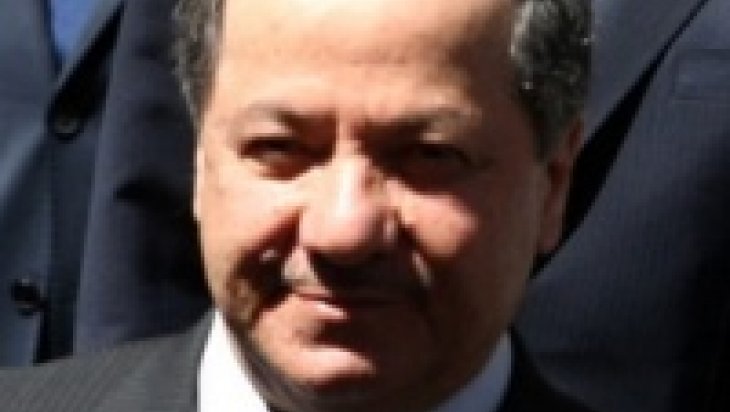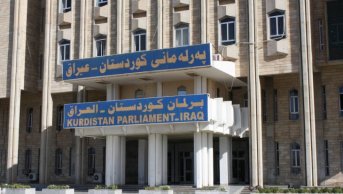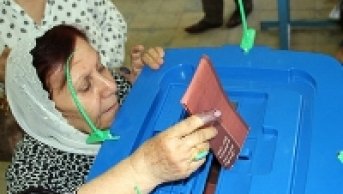Massoud Barzani's Visit to Baghdad: Reasons and Results

The president of the Kurdistan Regional Government (KRG) in Iraq paid a visit to Baghdad on Sunday, July 7, after a long wait.
The visit, which would not be of great importance in a country with a federal system, is very important in several aspects considering the unique circumstances of Iraq and its current political landscape.
Above all, this is the first visit KRG President Massoud Barzani has paid to Baghdad since efforts to form a government within the framework of the Arbil Agreement in 2010 (more than two years). During the period in between, Barzani did not go to Baghdad for various reasons, despite the fact that most high-level politicians in Iraq paid several visits to Arbil. Especially after the dispute that started with a political disagreement between Arbil and Baghdad last year attained a level that turned into a personal dispute between Nouri al-Maliki and Barzani, Barzani's visit to Baghdad became almost impossible.
Last year, military forces of the Iraqi central government and the KRG twice came to the brink of war, because tensions were so high (the Tuz Khormato/Kirkuk line and Zummar in Mosul). Also, showdowns with the use of force took place many times. Barzani accused Maliki of being a dictator and gave full support to the initiative to topple the Maliki government in parliament, and Maliki attempted to summon Barzani for questioning in parliament in Baghdad.
While the tension between Baghdad and Arbil peaked early this year, it has eased during the past three months. After a series of talks, KRG Prime Minister Nechirvan Barzani paid a visit to Baghdad on April 29, and signed a seven-point agreement with Iraqi Prime Minister Maliki. Following Nechirvan Barzani's visit, Maliki paid a visit to Arbil on June 9, and took an important step to break the ice between Arbil and Baghdad. Following the visit, in which the parties gave positive messages to each other, Massoud Barzani's visit to Baghdad might be described partially as a return visit and partially as a personal return to Iraq. In this context, the causes and importance of the visit can be listed as follows:
Reasons
1. Internal balances in Iraq rapidly change. There is an extremely slippery and fragile system of alliances. No party, group or political formation considers one another an eternal friend or enemy. Therefore, each party implements a constant dialogue and flexible relationship model. In this context, one should not be surprised to see a party or a leader appear close to a leader s/he had accused earlier.
2. Elections are on the way in in Iraq. The consequences of elections or upcoming elections are one of the most important reasons for the Maliki-Barzani dialogue. Maliki's relative failure on April 20 forced him to revise relations with the Kurds. The fact that Maliki realized he is not unrivaled in the south (in provinces predominantly populated by Shiite Arabs) forced him to turn towards the Kurds.
For Maliki, there are two important factors: a) To maintain his government until elections, and b) To get the support of the Kurds in order to be re-elected prime minister in the balanced environment that could appear after the elections. Unlike the previous year, it is highly likely that the Maliki government will be toppled if a vote of confidence was called in the Iraqi parliament for Prime Minister Maliki.
However, even if Maliki kept his first-rank position among the Shiites -- as the last election results indicate -- it is highly likely that if the Shiites formed two separate coalitions again in the 2014 elections, the coalition to be formed by the Sadr Movement and the Islamic Supreme Council of Iraq (ISCI) would defeat Maliki. Hence, Maliki's running for another term as prime minister depends on being supported by the Shiite coalition. Maliki must be supported by the Kurds regarding both factors. Therefore, Maliki has been trying to pave the way to get this support.
But Massoud Barzani is not at ease in the KRG, either. Although his term of office was extended to two years at the end of lots of disputes on June 30, the opposition has strongly reacted to this. It remains to be seen what kind of dynamics the election to be held on Sept. 21 will create in the KRG. Moreover, it is likely that the Patriotic Union of Kurdistan (PUK) and Kurdistan Democratic Party (KDP) alliance will not last in the elections to be held next year. Hence, the KDP's becoming a part of the government on its own in Baghdad without the PUK might be on the cards. Furthermore, if Massoud Barzani's term of office was extended only to two years (it might be extended to six years after the controversial re-election), he would become president of Iraq next. To this end, he needs to develop relations with Baghdad on a different basis.
3. The centralization-decentralization relationship in Iraq has entered a new phase. The fact that Maliki's centralization policies turned into accusations of authoritarianism, and the reflection of this reaction on the results of local elections brought forward again issues such as centralization, powers of local governments, sharing oil income and the status of disputed territories, as happened during 2005 to 2006 in Iraq. The enactment of legislation that gives broader authority to local governments (namely provinces) is a cornerstone. However, the authorities this law gives to provinces that are not federal districts also affected the center-periphery (Baghdad-Arbil) relationship in Iraq. So, the Baghdad-Arbil negotiations on certain issues (borders of disputed territories, oil law, budget, status of the peshmerga) mentioned below came to the forefront again.
4. Another important point of the visit for Massoud Barzani and the Iraqi Kurds is to convince the Baghdad government of issues they consider strategic for themselves. According to a common political opinion in Iraq, Prime Minister Maliki makes promises when he feels backed into a corner, and then he forgets all the promises when he gets stronger. During Nechirvan Barzani's visit, the issues, including Arbil's demands from Baghdad, became concrete through an agreement, which was shared with the public; similar agreements have been generally made behind closed doors.
To sum up, Kurds have been trying to make Maliki keep his promises when he is in a weak position.
The importance and results of the visit
The importance and results of Massoud Barzani's visit should be assessed in the short and long term.
Importance:
1. Massoud Barzani once again took the psychological advantage both in internal politics (KRG) and in relations with Baghdad. In the first place, he sent the prime minister to Maliki, who summoned him to Baghdad, then he made Maliki visit Arbil first. In the end, he went to Baghdad to talk to prominent political figures in Iraq. The fact that Massoud Barzani, Ibrahim Jafari, Usama al-Nujayfi, Ammar al-Hakim and Nouri al-Maliki were together at a lunch during Barzani's visit to Baghdad is quite symbolic. In the absence of Jalal Talabani, Massoud Barzani wanted to show that he would be a very important figure not only in Arbil but also in Baghdad, and he achieved this.
2. Maliki took another step back to keep his seat as prime minister in the short and long term. This will affect his relations with other politicians in the long term.
3. Iraq might have entered a politically stable period, even for a while. At least a couple of months are required to put the issues discussed into action. Iraq could overcome its political crisis unless an unexpected development occurs during this process.
4. Maliki will not have to deal with a political crisis in addition to attacks that are expected to increase during the month of Ramadan.
5. Massoud Barzani proved upon the withdrawal of Talabani that he is a very critical figure in Baghdad, even if he confronts problems in the KRG. It is important in terms of the extraordinary transition period the KDP used to extend Barzani's term of office, and to reinforce the arguments that Barzani cannot be replaced.
Short and long-term implications of the visit
1. The most probable result of the visit is the decrease in political tension in Baghdad. On the other hand, the fact that Talabani and Ayad Allawi, leaving their mark on the past decade of Iraqi politics, are no more on the political scene for a variety of reasons is important. Gradually, Talabani could take Barzani's place, and Nujayfi could take Allawi's place.
2. Even though the visit has eased tensions between Arbil and Baghdad for now, implementing the points of the agreement will lead to new crises. Maliki's putting the points of the agreement indicated below into action makes it possible for him to have good relations with the Kurds, but this situation would really annoy his supporters among Sunni Arabs and could even cause them to change sides. While putting the points of the agreement into action leads to a close relationship between the Kurds and Shiite Arabs, it might also make the Sunni Arabs feel excluded again.
3. The agreement signed between Maliki and Barzani is likely to bring along new political problems that are hard to solve in the long term, and a potential to create crises. The points of the agreement are as follows:
i. To prepare a special draft law (to compensate victims of the Anfal attacks, chemical weapons and mass killings), as the federal government will allocate an appropriate amount to help refugees and displaced people who live in the region.
ii. To form a supreme security committee for security cooperation.
iii. To form a committee of the two parties (Baghdad, Arbil) to investigate the details of the joint security administration in the disputed areas by special mechanisms managed by operations leaders, including the Dijla Operations Command.
iv. Joint action to draft a law to set the administrative border of the provinces as provided by the Presidency to parliament, as well as a law to cancel (revolutionary command council's decisions), which was submitted by the cabinet.
v. To form a joint committee to investigate judiciary, customs, travel and border crossing problems, and the same in the federal and regional governments.
vi. To request parliament to reconsider the Federal Budget Law for 2013 and its annexes.
vii. To form a technical committee of the two sides to agree on a draft law of oil and gas and the distribution of resources law.
It is seen from the delegation accompanying Barzani that the articles indicated above formed the main agenda of his visit. Some of those points have important psychological and symbolic meanings in political terms, as well as conditions that prevent a crisis in the long term. For example, Article 1 brings forward compensation for victims of the Anfal attacks, which are one of the most important cornerstones of the Iraqi Kurds' historical memory (chosen trauma). This article has more psychological and symbolic importance than financial. Article 2 and 3, on the other hand, seem to have been conceived as a caution against the possibility that political tensions, frequently repeated in 2008, 2009 and 2012, turn into an actual conflict. The Budget Law is an opportunity to overcome the economic problems the KRG has been confronting for a long time. Within this framework, the most critical points of the agreement are Article 4 and 7. Article 7 points to the oil law, which couldn't have been passed for a long time. Even though the enactment of the oil law could eliminate a very important political dispute in the country, the way the parties have handled the subject so far does not indicate whether they can reach an agreement in the long term.
Nevertheless, Article 4 is the most important of all in the case of being put into action. The issue of disputed territories, which is planned to be solved within the framework of Article 140 of the Iraqi constitution but is in a deadlock after the expiration of the article in 2007, leads to a new direction along with this agreement. The statement in the article is based on a proposal that was brought to the agenda in late 2011 and presented by the president (Talabani) to parliament in early 2012. Accordingly, there is ambiguity. The law proposal presented by Talabani is about all unfair changes made by the former regime with political purposes. Considering the subject within this scope, changing the administrative borders of provinces, which were changed in 1968, comes to the forefront.
Namely, it points out a province without the Duhok and Seladdin provinces, and a province with Kirkuk, Mosul and Baghdad with huge borders. If this is the plan, then considering the demographic and political conditions, the provinces of Mosul and Kirkuk will be under the influence of Kurds, and broadened Baghdad will be under the influence of Shiite Arabs. Considering the conditions of not only the revolutionary command council's decision but also it's being unfair, then there might be major changes in provinces such as Kirkuk with larger borders after excluding Chamchamal and Kalar from Sulaimaniya; Tuz Khormato from Kirkuk; Kifri from Diyala; Mosul upon including Akre, which is excluded from Duhok; and Seladdin would lose the majority of its Sunni Arab population in the case of a potential unification with Baghdad. (It is necessary to add provinces such as Khanaqin and its north, Najaf and Musana to these changes in the context of Diyala.)
Thus, the readjustment of borders is important not only in terms of defining the realm of authority of the KRG, but also in terms of defining which districts are federal districts in Iraq. All in all (as this is a very detailed subject, the details will be discussed in another article), the agreement between Maliki and Barzani might be concluded with the readjustment of borders of provinces in Iraq in terms of its long-term strategic results. Although it is a problem of the administrative organization in a country under normal circumstances, considering the current circumstances of Iraq, it involves very basic issues such as oil sharing, demographic balances, violence and declaration of federal districts.
Therefore, it is closely linked with the law granting more authority to provinces excluded in the past. However, the most important point that should not be forgotten is that similar issues have previously come to the forefront in Iraq, but were postponed because of political crises. Hence, the concrete results of the visit are limited as long as the articles of the agreement mentioned above are not put into action. Nevertheless, the importance of the visit in terms of representing overall political balances in Iraq should not be underestimated.










